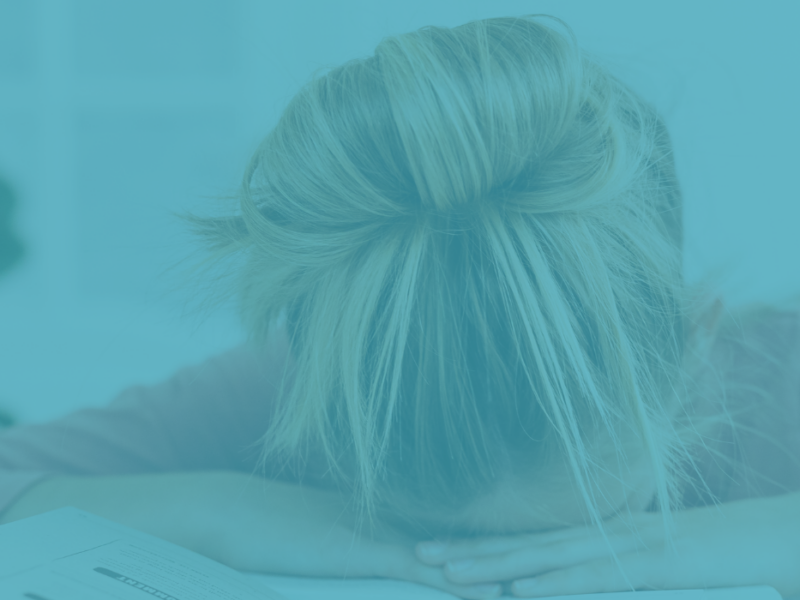For a significant portion of the last year, I was living a double life. To the outward world I worked hard to carry off the image of a passionate professional pushing through boundaries and milestones with enthusiasm.
Inside, however, I was a total mess.
When Covid hit, many were forced to slow down or slam on the brakes. Not this girl. I never once took my foot off the gas pedal. As part of a team working in a membership-driven organization, it was important to prove our worth by over-delivering in any and every way possible. Losing members threatened our organization’s livelihood. The longer Covid affected the world, the more we had to adjust to provide value. Our jobs literally depended on it.
As a result, my brain was and is ON. (Like, always on.) For nearly three years I’ve lived in a state of perpetual forward motion. Always wanting and needing to BE MORE and DO MORE. Always shifting and pivoting and scrutinizing. In addition to work, I was actively volunteering and, of course, taking care of my family.
You see where this is going, right?
A few months ago, during what should have been an extremely exciting time for me professionally, I hit rock bottom. I was irritable, detached and cynical. I couldn’t sleep. I was genuinely unhappy. I lost all motivation and started having daydreams of walking away from everything I had worked so hard to build.
Suffice it to say, I was suffering from burnout. And I was intensely ashamed to admit it.
Filled with fear, I worried that if my secret got out, people would lose confidence in my abilities. Would it undo everything I had worked so hard to build and achieve? Would people think less of me? Would I become a pariah?
I chose to suffer in silence.
It is one of my biggest regrets, because I’ve since come to discover that burnout is a serious issue that affects millions of people. Especially after Covid.
For high-achievers it’s a tricky thing to admit to. There is a sense of personal responsibility that makes you feel like you should be able to handle the demands of your job. No matter how intense. No matter the circumstances. Admitting to burnout feels like a sign of weakness or worse…failure.

RECOGNIZING THE SIGNS OF BURNOUT
According to the World Health Organization, burnout is “a syndrome resulting from chronic workplace stress that has not been successfully managed.” And although it may not be a medical condition per se, their research shows that it has serious health consequences.
Recognizing the signs as early as possible is critically important so that steps can be taken to heal. I denied my own symptoms for months. Both the burnout and denial were exhausting.
Classic signals you may be suffering from burnout include:
- feeling detached or cynical about your job
- experiencing a decrease in career satisfaction and motivation
- feeling overwhelmed by your responsibilities
- having difficulty concentrating
- experiencing a constant state of exhaustion
- suffering from headaches, insomnia and changes in appetite.
Once I recognized that I was in this state of fatigue I knew I had some work to do. I loved my career path but I needed some strategies. I knew I didn’t have the luxury of taking a sabbatical so I had to face the reality that I would have to continue on with my daily priorities while focusing on myself at the same time.
So I did what any information junkie would do. I went on a deep dive learning all about burnout and treatment options. And then I began to implement.

WAYS TO COMBAT BURNOUT (WHILE STAYING EMPLOYED)
Communicate with Your Organization: One of the first things I did was to talk to my supervisor. For all the reasons I mentioned previously, this first step was incredibly difficult. Surprisingly, it was also quite liberating. Once the cat was out of the proverbial bag, he was able to help me prioritize my projects and has been quite an ally in helping me keep boundaries in place. If you are feeling overwhelmed, it’s important to talk to your manager about your workload and any issues you may be experiencing. They may be able to offer additional support or resources to help you.
Take Inventory: Another quick step in the process was to take a step back and do a life inventory. I looked at my own personal habits, time and volunteer commitments, overall health and well being and, of course, my professional workload. Being honest with myself was critical. (Whether I liked it or not.) From there I formulated a plan to begin my recovery.
Learn to Set Boundaries: I am terrible at setting boundaries. It is something I am constantly working on. But establishing boundaries between your work and personal life is crucial to success in battling burnout. This means disconnecting from work when you’re not on the clock, and not checking work-related emails or taking calls or texts during your personal time. Learning to say “no” when you need to and making sure you’re not overcommitting to projects or tasks can be life-changing.
Prioritize Self-Care: Trust me, this is an important one. I experienced extreme challenges as a result of not prioritizing myself. (Like numbness or tingling in my arms due to severe vitamin deficiencies. I really wish I was joking. Stress can be debilitating.) Make sure you’re getting enough sleep, eating well, and exercising regularly. Carve out time for the things you love and enjoy, whether that’s reading a book, going for a walk, painting or spending time with friends and family. Focus on mindfulness and meditation to help you reduce anxiety. If you don’t care for yourself, you’ll find yourself off balance and sliding backwards very quickly.
Establish a Support System: Whether it’s a therapist, coach, a spouse, a mentor, group of friends or colleagues, talking to someone who understands what you’re going through can be incredibly significant. All it takes is someone who is willing to listen judgment free. I have a few go-to humans that help keep me in check when I need them and for that I am grateful!
Be Gentle With Yourself: Oftentimes we are our own worst enemies. We hold ourselves to unreasonable standards and harsh judgements. We say things to ourselves we would never dream of uttering to another human being. Be mindful of how you treat yourself throughout the day. Prioritize your needs, practice self-love and give yourself some grace. (Especially if you find yourself slipping into old habits!)
Healing from burnout takes time and intentionality. I am three months in and I’m very happy with my progress so far. (And I am learning some great habits.)
My biggest advice is to be patient with yourself and remember that it’s okay to take a step back from your work life, prioritize self-care, and set hard boundaries. You’ll find that you emerge stronger and more focused than ever.







Jen Yingling
Great share Jen. Thank you ♥️
Jennifer Gerlock
You are so welcome. We need to talk about these things and normalize them. No one should agonize in private when they can find a good support system!